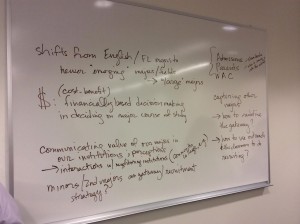Crisis Management: Between the Faculty and Upper Administration
Like many (all?) chairs nationwide, I’ve been facing a host of pressures regarding COVID matters, ranging from institutional demands for hybrid and F2F teaching to faculty feeling pressures about their scholarship, service obligations, and work-life balance. All of these are magnifying a question I’ve long struggled with as chair—how do I faithfully discharge my obligations to both my college administration and my departmental faculty, and how do I balance what seem to be their increasingly competing interests (if not demands) and do so without losing my integrity? Our faculty and campus are certainly not as divided as some I’ve read about, but that’s in part because we generally trust each other’s basic decency and intentions. Like so many other things, that trust is starting to come under some strain, which only seems to intensify the importance of my managing the chair’s intermediary role. But how do I do that without being seen—by either side—as two-faced or insufficiently understanding and supportive?


